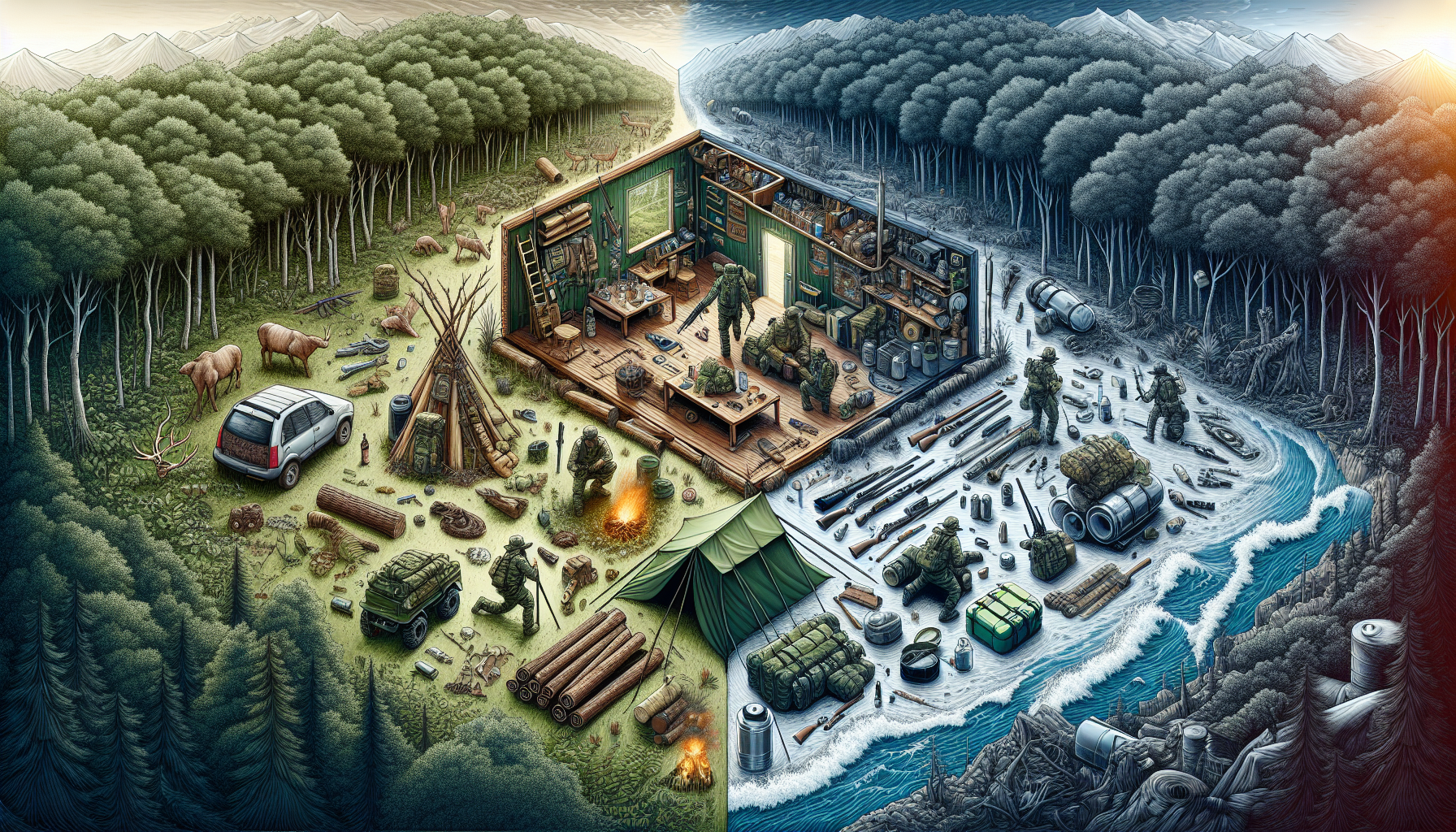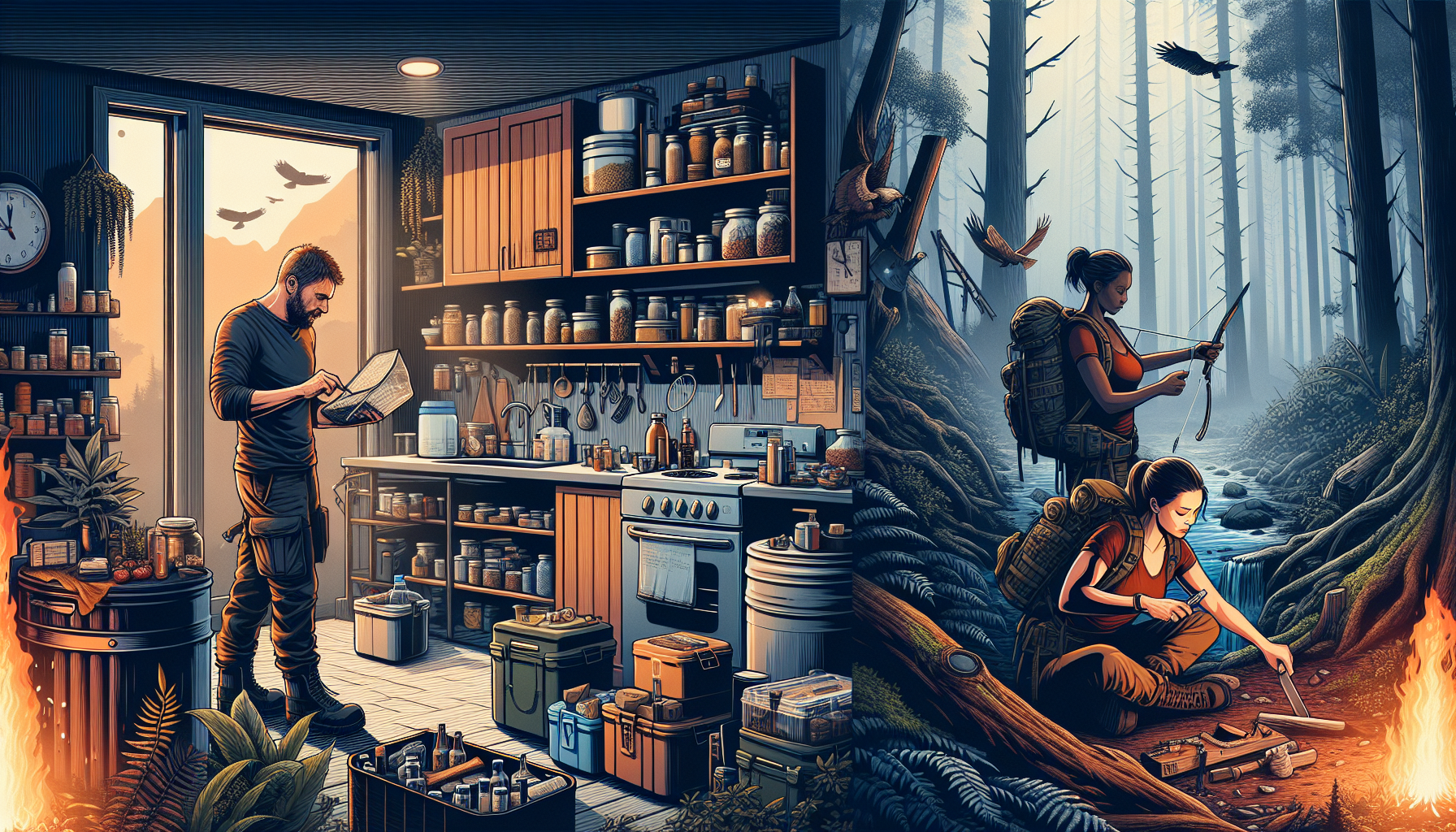In today’s ever-changing world, there is a growing interest in being prepared for unforeseen circumstances. Many people use the terms “preppers” and “survivalists” interchangeably, but are they really the same? While both groups share a common goal of preparing for emergencies, there are subtle differences that set them apart. In this article, we will explore the overlapping similarities and distinctive characteristics of these two groups, shedding light on the question: are preppers and survivalists the same? Prepare to gain a deeper understanding of these fascinating communities and their unique approaches to survival.

Definition of Preppers and Survivalists
Preppers
Preppers are individuals who actively prepare for potential emergencies, disasters, or life-altering events. They emphasize being ready for a variety of scenarios, such as natural disasters, economic collapses, pandemics, or power grid failures. Preppers typically focus on stockpiling supplies, learning survival skills, and creating sustainable systems for long-term self-sufficiency. While the term “prepper” can sometimes carry a negative connotation, it simply refers to those who prioritize preparedness in their daily lives.
Survivalists
Survivalists are similar to preppers in that they also prioritize preparedness, but they often take it to the next level. Survivalists are individuals who go beyond the basic prepping practices and adopt a more comprehensive approach to self-reliance. They focus on honing survival skills and acquiring the knowledge, tools, and resources necessary to thrive in extreme situations. Survivalists may undergo rigorous training, such as wilderness survival courses, to become proficient in various survival techniques.
Motivations and Goals
Preppers’ Motivations
Preppers are motivated by a desire to protect themselves and their loved ones from potential harm. They understand that emergencies can happen at any time and want to be prepared to face challenges that may arise. Preppers often have a sense of responsibility for their own well-being and believe in taking personal initiative to ensure their safety and the security of their family members. Their motivations stem from a belief that being self-sufficient and self-reliant is the best way to navigate uncertain times.
Preppers’ Goals
The primary goal of preppers is to be prepared for any situation that may disrupt their day-to-day life. They strive to have sufficient food, water, shelter, medical supplies, and other essentials to sustain themselves and their families for an extended period of time. Preppers also commonly aim to acquire skills such as gardening, first aid, and self-defense to supplement their preparedness efforts. Ultimately, their objective is to establish a secure foundation that can withstand various challenges and provide a sense of stability in times of crisis.
Survivalists’ Motivations
Survivalists are often driven by a deeper sense of concern for societal collapse or large-scale disasters. They believe that being fully prepared for worst-case scenarios is not only necessary for their own survival but also for the rebuilding of society. Survivalists want to safeguard not only themselves and their families but also the principles and values they hold dear. They see preparedness as a means to preserve freedom, independence, and the ability to thrive amidst chaos.
Survivalists’ Goals
The primary goal of survivalists is to develop the skills, knowledge, and resources needed to survive harsh and extreme conditions. They aim to thrive in environments where modern conveniences and infrastructure may no longer be accessible. Survivalists often focus on wilderness survival skills, such as fire-making, hunting, and shelter-building. They may also prioritize learning about herbal medicine, self-defense, and ways to purify water. Their ultimate goal is to be self-sufficient and adaptable, capable of thriving independently in challenging circumstances.
Preparation Focus
Preppers’ Preparation Focus
Preppers typically concentrate on compiling supplies and establishing a sustainable lifestyle. They prioritize accumulating an ample stockpile of food, water, medical supplies, and other essential resources. Preppers often invest in alternative energy sources, such as solar power or generators, to ensure they can maintain basic needs even during power outages. They may also focus on gardening, learning about permaculture techniques, and raising livestock to create a sustainable food source.
Survivalists’ Preparation Focus
Survivalists, while still valuing supplies and sustainability, place a greater emphasis on developing practical survival skills. They dedicate time and effort to learning how to forage for food, navigate using natural landmarks, start fires with primitive methods, and construct temporary shelters. Survivalists also prioritize physical fitness and mental resilience, as these qualities are crucial for enduring challenging conditions.
Duration of Survivalism
Preppers’ Duration of Survivalism
Preppers often adopt preparedness as a long-term lifestyle. They view it as an ongoing commitment rather than a short-term endeavor. Preppers incorporate preparedness habits into their daily routines, ensuring they are consistently ready for potential emergencies. Many preppers believe that being prepared is essential for a lifetime, as disasters can strike at any moment. They continuously evaluate and update their supplies, skills, and plans to adapt to changing circumstances.
Survivalists’ Duration of Survivalism
Survivalism, at its core, is centered around the idea of being prepared for extreme or prolonged disasters. Survivalists are committed to honing their survival skills and maintaining a high level of readiness indefinitely. While the intensity of survivalist practices may ebb and flow depending on the perceived threat level, survivalism is often considered a lifelong pursuit for dedicated individuals. Survivalists recognize that the skills they acquire and the knowledge they possess can be valuable assets in countless situations throughout their lives.

Levels of Preparedness
Preppers’ Levels of Preparedness
Preppers often approach preparedness in a tiered manner, focusing on different levels of readiness. The first level typically involves short-term emergency preparedness, with supplies and plans to sustain themselves for a few days or weeks. The next level may involve mid-term preparedness, extending their self-sufficiency to several months or even a year. Some preppers opt to take their preparedness a step further, reaching the level of long-term self-sufficiency where they can sustain themselves indefinitely.
Survivalists’ Levels of Preparedness
Survivalists, by nature, tend to prioritize long-term self-reliance and self-sufficiency. They often push beyond the levels typically associated with prepping. Survivalists strive to develop the skills, knowledge, and resources needed to not only survive but thrive in extreme conditions for extended periods. Their levels of preparedness may include the ability to navigate and survive in the wilderness, find and purify water, and hunt or gather food without relying on modern conveniences.
Community and Collaboration
Preppers’ Community and Collaboration
Preppers understand the value of community and often seek out like-minded individuals to collaborate with. They form networks or join prepper groups where they can share knowledge, exchange resources, and support each other in times of need. Preppers recognize that building a strong community can enhance their chances of survival, as collaborating allows for the pooling of skills, supplies, and collective problem-solving.
Survivalists’ Community and Collaboration
Survivalists, while also valuing community, may have a more independent mindset. They often prioritize individual skills and self-reliance but still recognize the importance of networking with others who share their mindset. Survivalists may come together to exchange knowledge, attend workshops, or participate in training programs to sharpen their skills. While collaboration is important, survivalists often place a greater emphasis on individual capabilities due to the extreme nature of the scenarios they envision.
Self-Sufficiency vs. Collaboration
Preppers’ View on Self-Sufficiency
Preppers generally believe in the importance of self-sufficiency as a foundation for preparedness. They strive to have the necessary resources and abilities to sustain themselves and their families without relying on external assistance during emergencies. Preppers often see self-sufficiency as a means to maintain control over their own destinies and reduce vulnerability to unexpected events.
Survivalists’ View on Self-Sufficiency
Survivalists share a similar perspective with preppers when it comes to self-sufficiency. However, survivalists may take it a step further by focusing on self-sufficiency in harsh and extreme conditions. They believe that being able to survive and thrive independently, even in the absence of modern infrastructure and resources, is essential to confront the types of scenarios they envision.
Preppers’ View on Collaboration
Preppers recognize that collaboration and community support are vital during emergencies. They believe that pooling resources, knowledge, and skills with trusted individuals can increase their chances of survival and aid in the recovery process. Preppers actively seek opportunities to collaborate with others, share information, and provide mutual assistance within their communities.
Survivalists’ View on Collaboration
While survivalists value collaboration, they often emphasize a more self-reliant approach. They understand that extreme survival situations may not allow for the luxury of relying heavily on others. While they acknowledge the importance of networking and learning from like-minded individuals, survivalists focus on developing individual skills and relying on self-reliance as the primary foundation for their survival strategies.
Methods and Techniques
Preppers’ Methods and Techniques
Preppers employ a wide range of methods and techniques to enhance their preparedness. They may attend workshops or take online courses to learn skills such as first aid, gardening, food preservation, and self-defense. Preppers often prioritize storing and rotating food supplies, establishing sustainable water sources, and creating home security systems. They may also invest in alternative energy sources, communication devices, and emergency medical equipment.
Survivalists’ Methods and Techniques
Survivalists place great importance on acquiring practical survival skills and often engage in hands-on training and real-life simulations. They learn techniques such as fire-making, shelter-building, primitive trapping, and tracking. Survivalists often immerse themselves in nature, honing their abilities to rely on natural resources and their own ingenuity. They may also practice wilderness navigation, camouflage, and survival psychology to supplement their skillset.
Equipment and Resources
Preppers’ Equipment and Resources
Preppers invest in a range of equipment and resources to support their preparedness efforts. They prioritize stockpiling food, water, and medical supplies for potential emergencies. Preppers may also accumulate tools and equipment for various tasks such as gardening, cooking, communication, and self-defense. Additionally, they often possess backup power sources, such as generators or solar panels, to ensure access to electricity during times of crisis.
Survivalists’ Equipment and Resources
Survivalists focus on equipment and resources that enable them to navigate and survive in extreme conditions. They value lightweight, durable gear suitable for outdoor adventures and environments. Survivalists usually possess items such as high-quality knives, fire-starting tools, water filtration systems, compact stoves, navigation devices, and camping equipment. They prioritize items that serve multiple purposes and are highly functional in austere settings.
Role of Apocalypse in Prepping and Survivalism
Preppers’ View on Apocalypse
While some preppers prepare for worst-case scenarios that could be considered apocalyptic, such as global pandemics or economic collapses, not all preppers view an apocalyptic event as inevitable. Preppers understand that disasters can take various forms and focus on preparing for a broad range of emergencies, both large and small. They seek to build resilience and be ready for any situation that may disrupt their lives, regardless of how catastrophic it may be.
Survivalists’ View on Apocalypse
Survivalists, on the other hand, often incorporate the concept of an apocalypse into their preparedness mindset. They may hold the belief that a major societal collapse or catastrophic event is more likely and aim to be fully equipped to navigate such scenarios. Survivalists emphasize training and resources that specifically apply to extreme conditions and long-term self-reliance, aligning with their perception of a potential apocalyptic event.
In conclusion, while there are similarities between preppers and survivalists in terms of their commitment to preparedness, their motivations, goals, and approaches differ in various aspects. Preppers place emphasis on readiness for different types of emergencies, often with a focus on sustainability and community collaboration. Survivalists go beyond basic preparedness, aligning their efforts with the possibility of extreme or long-term survival scenarios. Both groups play a crucial role in prioritizing resilience and being proactive in the face of uncertainty, ultimately enhancing their chances of thriving in challenging circumstances.
